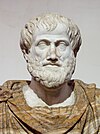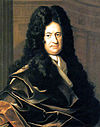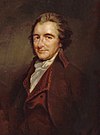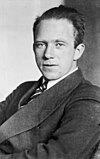Lista deistan
Na yew lista parçekiya ke merdumanê deistan kategorize kena, êyê ke bıngehê baweriya Homayi tenya dinê tebii sera gênê, ya zi baweriya heqiqetê dini muhakemekerdış ra dıme wehiyê kıtabanê firazan ya zi peyğamberan ra nêgênê. Êyê ke seba tesirê deizmi ra, ya zi namdariya xo dorhêma binan de esta, çıniyê we.























Referansi
[bıvurne | çımeyi bıvurne]- ↑ Lua error Xetay pele Modul:Citation/CS1 dı rêza 845 de ya: Argument map not defined for this variable: NameListStyle.
- ↑ Lua error Xetay pele Modul:Citation/CS1 dı rêza 845 de ya: Argument map not defined for this variable: NameListStyle.
- ↑ Lua error Xetay pele Modul:Citation/CS1 dı rêza 845 de ya: Argument map not defined for this variable: NameListStyle.
- ↑ Lua error Xetay pele Modul:Citation/CS1 dı rêza 845 de ya: Argument map not defined for this variable: NameListStyle.
- ↑ Atheist Becomes Theist - Biola News and communications
- ↑ The Times obituary of Adam Smith
- ↑ V. Minorsky. Mongol Place-Names in Mukri Kurdistan (Mongolica, 4), Bulletin of the School of Oriental and African Studies, University of London, Vol. 19, No. 1, pp. 58-81 (1957), p. 66. JSTOR
- ↑ Lua error Xetay pele Modul:Citation/CS1 dı rêza 845 de ya: Argument map not defined for this variable: NameListStyle.
- ↑ Lua error Xetay pele Modul:Citation/CS1 dı rêza 845 de ya: Argument map not defined for this variable: NameListStyle.
- ↑ Lua error Xetay pele Modul:Citation/CS1 dı rêza 4124 de ya: attempt to call field 'set_message' (a nil value).
- ↑ Lua error Xetay pele Modul:Citation/CS1 dı rêza 845 de ya: Argument map not defined for this variable: NameListStyle.
- ↑ Lua error Xetay pele Modul:Citation/CS1 dı rêza 845 de ya: Argument map not defined for this variable: NameListStyle.
- ↑ The Autobiography of Benjamin Franklin from earlyamerica.com
- ↑ "Archive copy". Archived from the original on 2007-10-16. https://web.archive.org/web/20071016102456/http://pastemagazine.com/action/article/4639/feature/music/greg_graf.
- ↑ Lua error Xetay pele Modul:Citation/CS1 dı rêza 845 de ya: Argument map not defined for this variable: NameListStyle.
- ↑ Lua error Xetay pele Modul:Citation/CS1 dı rêza 845 de ya: Argument map not defined for this variable: NameListStyle.
- ↑ "Error: no
|title=specified when using{{Cite web}}". http://www.encyclopedia.com/topic/Carl_Friedrich_Gauss.aspx. - ↑ Lua error Xetay pele Modul:Citation/CS1 dı rêza 845 de ya: Argument map not defined for this variable: NameListStyle.
- ↑ Lua error Xetay pele Modul:Citation/CS1 dı rêza 845 de ya: Argument map not defined for this variable: NameListStyle.
- ↑ Lua error Xetay pele Modul:Citation/CS1 dı rêza 845 de ya: Argument map not defined for this variable: NameListStyle.
- ↑ Deism Archived 2008-10-02 at the Wayback Machine - Entry in the Dictionary of the History of Ideas
- ↑ Lua error Xetay pele Modul:Citation/CS1 dı rêza 845 de ya: Argument map not defined for this variable: NameListStyle.
- ↑ Lua error Xetay pele Modul:Citation/CS1 dı rêza 845 de ya: Argument map not defined for this variable: NameListStyle.
- ↑ Freethought Traditions in the Islamic World Archived 2012-02-14 at the Wayback Machine by Fred Whitehead; also quoted in Cyril Glasse, (2001), The New Encyclopedia of Islam, p. 278. Rowman Altamira.
- ↑ "Error: no
|title=specified when using{{Cite web}}". http://www.iep.utm.edu/h/herbert.htm. - ↑ "Elihu Palmer - First Presbyterian Church of Newtown". Archived from the original on 2006-12-13. https://web.archive.org/web/20061213094003/http://www.fpcn.org/history/pastors/palmer/.
- ↑ Lua error Xetay pele Modul:Citation/CS1 dı rêza 845 de ya: Argument map not defined for this variable: NameListStyle.
- ↑ Lua error Xetay pele Modul:Citation/CS1 dı rêza 845 de ya: Argument map not defined for this variable: NameListStyle.
- ↑ Ethan Allen. "Archive copy". Archived from the original on 2004-12-10. https://web.archive.org/web/20041210113657/http://www.deism.org/ethanallen.htm.
- ↑ "Frederick the Great - Hyperhistory.net". Archived from the original on 2009-08-21. https://web.archive.org/web/20090821104641/http://www.hyperhistory.net/apwh/bios/b2frederick2.htm.
- ↑ Lua error Xetay pele Modul:Citation/CS1 dı rêza 845 de ya: Argument map not defined for this variable: NameListStyle.
- ↑ "In a commentary on Shaftesbury published in 1720, Gottfried Wilhelm Leibniz, a Rationalist philosopher and mathematician, accepted the Deist conception of God as an intelligent Creator but refused the contention that a god who metes out punishments is evil." Andreas Sofroniou, Moral Philosophy, from Hippocrates to the 21st Aeon, page 197.
- ↑ "Consistent with the liberal views of the Enlightenment, Leibniz was an optimist with respect to human reasoning and scientific progress (Popper 1963, p.69). Although he was a great reader and admirer of Spinoza, Leibniz, being a confirmed deist, rejected emphatically Spinoza's pantheism: God and nature, for Leibniz, were not simply two different "labels" for the same "thing". Shelby D. Hunt, Controversy in marketing theory: for reason, realism, truth, and objectivity (2003), page 33.
- ↑ "Archive copy". Archived from the original on 2009-02-13. https://web.archive.org/web/20090213155912/http://www.bartleby.com/65/le/LessingG.html.
- ↑ 35.0 35.1 "Archive copy". Archived from the original on 2013-10-24. https://web.archive.org/web/20131024133335/http://www.vqronline.org/articles/2003/autumn/holmes-religion-james-monroe/.
- ↑ Lua error Xetay pele Modul:Citation/CS1 dı rêza 845 de ya: Argument map not defined for this variable: NameListStyle.
- ↑ Domenico Monetti. "Error: no
|title=specified when using{{Cite web}}". http://www.angelfire.com/ab/harmonykorine/venice.html. - ↑ Lua error Xetay pele Modul:Citation/CS1 dı rêza 4124 de ya: attempt to call field 'set_message' (a nil value).
- ↑ Lua error Xetay pele Modul:Citation/CS1 dı rêza 845 de ya: Argument map not defined for this variable: NameListStyle.
- ↑ Yobazlık Bir Fikir Müstehasesidir, Nihâl Atsız, Ötüken Dergisi, 1970, Sayı: 11
- ↑ Lua error Xetay pele Modul:Citation/CS1 dı rêza 845 de ya: Argument map not defined for this variable: NameListStyle.
- ↑ Lua error Xetay pele Modul:Citation/CS1 dı rêza 845 de ya: Argument map not defined for this variable: NameListStyle.
- ↑ Lua error Xetay pele Modul:Citation/CS1 dı rêza 845 de ya: Argument map not defined for this variable: NameListStyle.
- ↑ Lua error Xetay pele Modul:Citation/CS1 dı rêza 4124 de ya: attempt to call field 'set_message' (a nil value).
- ↑ Lua error Xetay pele Modul:Citation/CS1 dı rêza 4124 de ya: attempt to call field 'set_message' (a nil value).
- ↑ "The dividing line between Deism and atheism among the Philosophes was often rather blurred, as is evidenced by Le Rêve de d'Alembert (written 1769; "The Dream of d'Alembert"), which describes a discussion between the two "fathers" of the Encyclopédie: the Deist Jean Le Rond d'Alembert and the atheist Diderot." Andreas Sofroniou, Moral Philosophy, from Hippocrates to the 21st Aeon, page 197.
- ↑ "Error: no
|title=specified when using{{Cite web}}". http://www.nndb.com/people/473/000108149/. - ↑ "Error: no
|title=specified when using{{Cite web}}". http://www.jewishencyclopedia.com/view.jsp?artid=209&letter=D. - ↑ "Archive copy". Archived from the original on 2013-10-03. https://web.archive.org/web/20131003125913/http://www.logosjournal.com/issue_4.1/thompson_printable.htm.
- ↑ "Archive copy". Archived from the original on 2013-10-04. https://web.archive.org/web/20131004115524/http://relijournal.com/religion/dr-jose-rizal-the-foremost-filipino-deist/.
- ↑ Lua error Xetay pele Modul:Citation/CS1 dı rêza 4124 de ya: attempt to call field 'set_message' (a nil value).
- ↑ Lua error Xetay pele Modul:Citation/CS1 dı rêza 4124 de ya: attempt to call field 'set_message' (a nil value).
- ↑ Lua error Xetay pele Modul:Citation/CS1 dı rêza 845 de ya: Argument map not defined for this variable: NameListStyle.
- ↑ Lua error Xetay pele Modul:Citation/CS1 dı rêza 4124 de ya: attempt to call field 'set_message' (a nil value).
- ↑ Lua error Xetay pele Modul:Citation/CS1 dı rêza 4124 de ya: attempt to call field 'set_message' (a nil value).
- ↑ Lua error Xetay pele Modul:Citation/CS1 dı rêza 4124 de ya: attempt to call field 'set_message' (a nil value).
- ↑ "Archive copy". Archived from the original on 2014-11-03. https://web.archive.org/web/20141103152619/http://www.lysanderspooner.org/deists/deistsreplymain.html.
- ↑ 58.0 58.1 "Archive copy". Archived from the original on 2015-05-03. https://web.archive.org/web/20150503030246/http://www.adherents.com/largecom/fam_deist.html.
- ↑ Dale Essary. "Archive copy". Archived from the original on 2015-09-24. https://web.archive.org/web/20150924113921/http://www.tektonics.org/guest/gardnermartin01.html.
- ↑ "Archive copy". Archived from the original on 2006-03-16. https://web.archive.org/web/20060316080949/http://www.onr.com/user/bejo/tindal.htm.
- ↑ Lua error Xetay pele Modul:Citation/CS1 dı rêza 845 de ya: Argument map not defined for this variable: NameListStyle.
- ↑ Rit Nosotro. "Archive copy". Archived from the original on 2013-04-26. https://web.archive.org/web/20130426142636/http://www.hyperhistory.net/apwh/bios/b2born-max.htm#end7.
- ↑ Lua error Xetay pele Modul:Citation/CS1 dı rêza 845 de ya: Argument map not defined for this variable: NameListStyle.
- ↑ "Archive copy". Archived from the original on 2014-10-08. https://web.archive.org/web/20141008104103/http://www.fordham.edu/halsall/mod/robespierre-supreme.html.
- ↑ Tatyana Klevantseva. "Error: no
|title=specified when using{{Cite web}}". http://russiapedia.rt.com/prominent-russians/science-and-technology/mikhail-lomonosov/. - ↑ "Error: no
|title=specified when using{{Cite web}}". http://www.sullivan-county.com/id2/judaism.htm. - ↑ Jennifer Michael Hecht, "Doubt: A History: The Great Doubters and Their Legacy of Innovation from Socrates and Jesus to Thomas Jefferson and Emily Dickinson", pg. 227-230
- ↑ Ronald Bruce Meyer. "Archive copy". Archived from the original on 2004-01-06. https://web.archive.org/web/20040106223101/http://www.ronaldbrucemeyer.com/rants/0815almanac.htm.
- ↑ Lua error Xetay pele Modul:Citation/CS1 dı rêza 845 de ya: Argument map not defined for this variable: NameListStyle.
- ↑ Talia Soghomonian. "Archive copy". Archived from the original on 2 February 2012. https://web.archive.org/web/20120202015758/http://www.musicomh.com/music/features/nick-cave_0308.htm.
- ↑ "Error: no
|title=specified when using{{Cite web}}". http://www.guardian.co.uk/books/audio/2009/sep/10/nick-cave-bunny-munro. - ↑ "Error: no
|title=specified when using{{Cite web}}". http://www.sciam.com/article.cfm?articleID=000C055B-0CBB-1306-8A6883414B7F0000. - ↑ Lua error Xetay pele Modul:Citation/CS1 dı rêza 4124 de ya: attempt to call field 'set_message' (a nil value).
- ↑ James R. Wible. "Archive copy". Archived from the original on 2013-07-22. https://web.archive.org/web/20130722222500/http://www.cspeirce.com/menu/library/aboutcsp/wible/createvol.pdf.
- ↑ In a correspondence on the matter Edison said: "You have misunderstood the whole article, because you jumped to the conclusion that it denies the existence of God. There is no such denial, what you call God I call Nature, the Supreme intelligence that rules matter. All the article states is that it is doubtful in my opinion if our intelligence or soul or whatever one may call it lives hereafter as an entity or disperses back again from whence it came, scattered amongst the cells of which we are made." New York Times. October 2, 1910, Sunday.
- ↑ "Archive copy". Archived from the original on 2015-05-18. https://web.archive.org/web/20150518070035/http://www.monticello.org/site/research-and-collections/jeffersons-religious-beliefs.
- ↑ Michael Corbett and Julia Mitchell Corbett, Politics and religion in the United States (1999) p. 68
- ↑ Dulles, Avery (January 2005). "The Deist Minimum". First Things: A Monthly Journal of Religion and Public Life (149): 25ff. Archived from the original on 2010-12-30. https://web.archive.org/web/20101230193737/http://www.firstthings.com/article/2008/08/the-deist-minimum--28. Retrieved 2014-09-23.
- ↑ "Archive copy". Archived from the original on 2014-08-14. https://web.archive.org/web/20140814205007/http://www.fordham.edu/halsall/mod/paine-deism.html.
- ↑ "Error: no
|title=specified when using{{Cite web}}". http://www.nndb.com/people/665/000026587/. - ↑ "Archive copy". Archived from the original on 2009-09-29. https://web.archive.org/web/20090929061523/http://www.deism.com/voltaire.htm.[dead link]
- ↑ "Error: no
|title=specified when using{{Cite web}}". http://www.huffingtonpost.com/max-tegmark/angry-atheists_b_2716134.html. - ↑ Lua error Xetay pele Modul:Citation/CS1 dı rêza 845 de ya: Argument map not defined for this variable: NameListStyle.
- ↑ Lua error Xetay pele Modul:Citation/CS1 dı rêza 845 de ya: Argument map not defined for this variable: NameListStyle.
- ↑ Lua error Xetay pele Modul:Citation/CS1 dı rêza 845 de ya: Argument map not defined for this variable: NameListStyle.
- ↑ Lua error Xetay pele Modul:Citation/CS1 dı rêza 845 de ya: Argument map not defined for this variable: NameListStyle.
- ↑ "Archive copy". Archived from the original on 2015-05-03. https://web.archive.org/web/20150503022124/http://basicfamouspeople.com/index.php?aid=1911.
- ↑ Lua error Xetay pele Modul:Citation/CS1 dı rêza 780 de ya: attempt to index field 'invisible_defs' (a nil value).